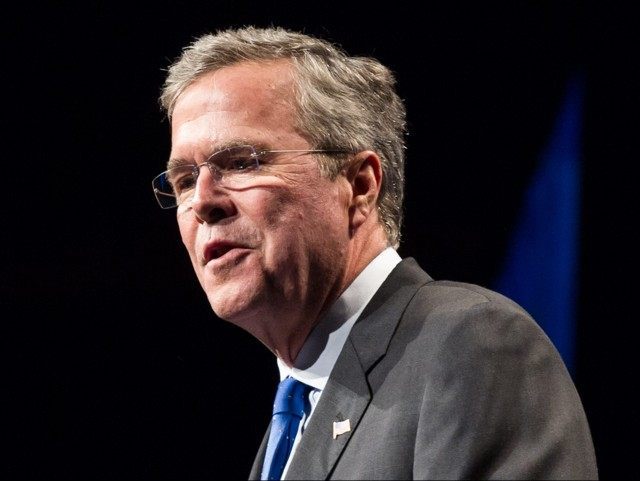At long last on Monday, former Florida Governor Jeb Bush formally entered the presidential race–on the three-year anniversary of President Barack Obama’s Deferred Action for Childhood Arrivals (DACA) executive amnesty, no less–and promised that the next president will pass “meaningful immigration reform.”
He may not have planned to say anything on immigration–those words were not in his prepared remarks–but hecklers in the Miami Dade College audience compelled him to do so.
“By the way, just so that our friends know, the next president of the United States will pass meaningful immigration reform so that will be solved–not by executive order!” Bush told the hecklers.
Bush, who has said that illegal immigration is an “act of love” and granting legal status for illegal immigrants is “rational” and “thoughtful,” has previously told DREAMers that he would undo Obama’s executive amnesty in order to push legislation to make them permanent. He has also gone back and forth between supporting a “path to legal status” for illegal immigrants and full citizenship.
Vowing to “campaign as I would serve, going everywhere, speaking to everyone, keeping my word, facing the issues without flinching, and staying true to what I believe,” Bush listed off a litany of promises. He called for reforming the tax code in order to eliminate “special favors for the few reducing rates for all.” He spoke of 4% of economic growth and how he would show Congress how spending bills can be vetoed.
He also blasted Hillary Clinton for saying that religious beliefs “have to be changed” to accommodate more abortions and criticized Obamacare and the Obama administration’s “shabby treatment of the Little Sisters of the Poor, a Christian charity that dared to voice objections of conscience to Obamacare.”
“The next president needs to make it clear that great charities like the Little Sisters of the Poor need no federal instruction in doing the right thing,” he said. “It comes down to a choice between the Little Sisters and Big Brother, and I’m going with the Sisters.”
Bush also slammed Obama for his “lectures on the Middle Ages when we are dealing abroad with modern horrors committed by fanatics,” saying that, “it’s still a mystery to me why, in these violent times, the president a few months ago thought it relevant at a prayer breakfast to bring up the Crusades.”
He condemned the “Obama-Clinton-Kerry” team for their “phone-it-in foreign policy” that is leaving “a legacy of crises uncontained, violence unopposed, enemies unnamed, friends undefended, and alliances unraveling.” And he vowed to “rebuild our vital friendships” around the world, which he said “starts by standing with the brave, democratic State of Israel.”
But his full embrace of comprehensive amnesty legislation–Bush has even said he would try to convince conservatives to support amnesty and is willing to “lose the primary” to win the general election–puts him on the same side as permanent political class he promised to disrupt.
Trying to run as an outsider and a reformer even though he is the ultimate establishment insider, Bush said that “it is time to start “making rules for the rule-makers.” Bush vowed to take Washington, which he called the “static capital of this dynamic country,” out of the business of causing problems. He promised to “challenge the culture that has made lobbying the premier growth industry in the nation’s capital.”
“The rest of the country struggles under big government, while comfortable, complacent interest groups in Washington have been thriving on it,” he said. “A self-serving attitude can take hold in any capital, just as it once did in Tallahassee. I was a governor who refused to accept that as the normal or right way of conducting the people’s business. I will not accept it as the standard in Washington.”
He added that “we don’t need another president who merely holds the top spot among the pampered elites of Washington” and declared that he would be one who would be “willing to challenge and disrupt the whole culture in our nation’s capital.”
“I will be that president because I was a reforming governor, not just another member of the club,” he said.
It has been said that amnesty represents the greatest divide between the elites who make up the permanent political class on Wall Street and Washington and voters on Main Street. And on this issue, Bush’s rhetoric has made him sound like the charter member of the permanent political class club.
In poll after poll, Americans have indicated that they do not want more immigration–just 7% wanted more immigration in a recent Gallup poll while 70% in a recent Pew Research survey did not even want more immigration. Bush, on the other hand, has called for eliminating caps on foreign guest-worker permits and supported the Gang of Eight’s comprehensive amnesty bill that would have potentially tripled the number of immigrants the country admits.
His views on immigration are out of touch with the Republican base, and that has left him with nearly no margin for error in the campaign. Even in New Hampshire (Bush currently has a slight lead in New Hampshire in the RealClearPolitics average of the polls), the first-in-the-nation primary state that he may have to win, a recent Bloomberg/Saint Anselm College poll found that a whopping 41% of Republican primary voters in Granite State said Bush’s stance on immigration was a “deal-killer.”

COMMENTS
Please let us know if you're having issues with commenting.